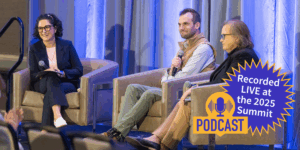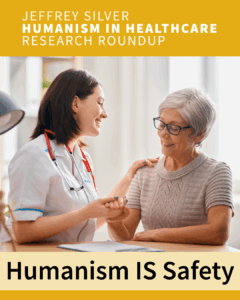
The Jeffrey Silver Humanism in Healthcare Research Roundup features summaries of recently published studies on humanism in healthcare. To receive email notification of new studies once per month, enter your information here and select “Jeffrey Silver Research Roundup” from the checkboxes at the bottom. See previous posts in this series.
Publications from Gold-Affiliated Authors
Can Patient-Provider Interpersonal Interventions Achieve the Quadruple Aim of Healthcare? A Systematic Review. Haverfield MC, Tierney A, Schwartz R, Bass MB, Brown-Johnson C, Zionts DL, Safaeinili N, Fischer M, Shaw JG, Thadaney S, Piccininni G, Lorenz KA, Asch SM, Verghese A, Zulman DM. J Gen Intern Med. 2020 Jan 9. Dr. Abraham Verghese is a former Gold Foundation Trustee and gave both the 2012 and 2005 Jordan J. Cohen Humanism in Medicine Lecture at the AAMC.
In recent years, healthcare has embraced the Quadruple Aim: improving population health, patient experience, cost of care, and provider experience. But what interpersonal interventions have the greatest potential to advance these aims? Dr. Marie Haverfield and colleagues aimed to answer this question through a systematic review of 21,835 studies, narrowing it to 73 articles that fit their inclusion criteria. Overall, they found that interpersonal skills can be taught and may impact a variety of outcomes. Some approaches that showed promise included teaching communication skills or techniques, mindfulness, and shared decision-making. Despite encouraging results, the authors note some limitations: (1) the lack of studies that considered cost and cost-related outcomes, (2) the lack of interventions focusing on both practitioners and patients, and (3) insufficient descriptions of interventions to synthesize results. Nevertheless, they conclude that “interventions that require only minimal to moderate demands may have the potential to improve patient experience, provider experience, and features of patient health.”
Practices to Foster Physician Presence and Connection With Patients in the Clinical Encounter. Zulman DM, Haverfield MC, Shaw JG, Brown-Johnson CG, Schwartz R, Tierney AA, Zionts DL, Safaeinili N, Fischer M, Thadaney Israni S, Asch SM, Verghese A. JAMA. 2020 Jan 7;323(1):70-81. Dr. Abraham Verghese is a former Gold Foundation Trustee and gave both the 2012 and 2005 Jordan J. Cohen Humanism in Medicine Lecture at the AAMC.
Despite modern advances in treatment and care delivery, there continues to be an enduring need to build personal connections between physicians and patients. Part of this is presence, that is, the purposeful practice of awareness, focus, and attention with the intent to understand and connect with patients. So how can physician presence be fostered? Dr. Donna Zulman and colleagues conducted a mixed-methods study to identify the “top 5” practices that have the potential to enhance meaningful connections with patients during the clinical encounter. To do so, they first performed a systematic review that identified 31 practices ranging from the “warm-up act” to “humor” and “proactive scheduling.” They discussed these findings as part of a 14-researcher panel and utilized Likert scales to grade the potential effect on patient and clinician experience and feasibility of intervention. After a three-round modified Delphi process, they synthesized five recommendations: (1) prepare with intention, (2) listen intently and completely, (3) agree on what matters most, (4) connect with the patient’s story, and (5) explore emotional cues. The authors note that these interventions can be adopted with relative ease, but larger “technological, business, and regulatory” pressures that threaten physician presence must also be addressed.
The impact of mindfulness-based interventions on doctors’ well-being and performance: A systematic review. Scheepers RA, Emke H, Epstein RM, Lombarts KMJMH. Med Educ. 2019 Dec 22. Dr. Ronald Epstein is a Mapping the Landscape grantee and a recipient of the Arnold P. Gold Humanism in Medicine Award given by The Society of Teachers of Medicine.
Mindfulness is defined as an “awareness that arises through the paying of purposeful and non-judgmental attention to the present moment in a stressful practice environment.” There is some evidence to suggest that mindfulness-based interventions may reduce levels of burnout, but can they improve physician well-being or performance? Dr. Renée Scheepers and colleagues performed a systematic review of 934 articles to help answer this question. They found 24 studies that incorporated essential mindfulness training elements or group-based training for mindfulness. These studies suggested that physicians who participated in mindfulness-based interventions have lower levels of negative well-being (burnout, stress, and anxiety) and higher levels of positive well-being (empowerment, dedication, and satisfaction). Programs with positive effects often included multiple elements of mindfulness or used a group format. The authors note that questions remain about feasibility and standardization. Additionally, since these findings are based on self-reports from physicians, more studies are warranted to determine if there are effects on care from the patient’s perspective.
The impact of the caregiver-oncologist relationship on caregiver experiences of end-of-life care and bereavement outcomes. An AW, Ladwig S, Epstein RM, Prigerson HG, Duberstein PR. Support Care Cancer. 2020 Jan 3. Dr. Ronald Epstein is a Mapping the Landscape grantee and a recipient of the Arnold P. Gold Humanism in Medicine Award given by The Society of Teachers of Medicine.
Caregivers are vital for patients to navigate the course of their cancer care, but only a few studies have so far been conducted to investigate caregiver-physician relationships. To better understand the quality of these relationships, Dr. Amy W. An and colleagues analyzed data from the Values and Options in Cancer Care (VOICE) study, a randomized control trial that investigated communication skills in 204 caregiver/patient dyads. They found that positive experience with the oncologist was associated with better quality of death, greater acceptance of cancer experience, and decreased decisional regret. However, there was no significant association with psychological adjustment. These suggest that the caregivers’ early experiences with oncologists have lasting effects on caregivers themselves in addition to patients. The authors conclude “strengthening the relationship may improve caregiver experiences of EOL [end of life] care and satisfaction with cancer care.”
Developing the family support tool: An interactive, web-based tool to help families navigate the complexities of surrogate decision making in ICUs. Suen AO, Butler RA, Arnold R, Myers B, Witteman HO, Cox CE, Argenas A, Buddadhumaruk P, Bursic A, Ernecoff NC, Shields AM, Tran DK, White DB. J Crit Care. 2019 Dec 6;56:132-139. Dr. Robert Arnold is a Mapping the Landscape grantee.
Critically ill patients are often so sick that they cannot make or communicate decisions to their physicians. That means that surrogates are often driving care, but studies show that they feel emotionally and psychologically overwhelmed. To facilitate their role, Dr. Angela Suen and colleagues developed a web-based Family Support Tool, which included videos and interactive exercises. They did this by convening an expert panel to design the tool, engaging a key stakeholder panel to refine this tool, testing the tool by six former ICU surrogates, creating a web-based prototype, and then testing the prototype with 14 surrogates and ICU physicians. They found that the tool was highly usable, acceptable, and effective. They plan on further testing the tool in a pilot randomized control trial.
Developing institutional infrastructure for physician wellness: qualitative insights from VA physicians. Free full text Schwartz R, Shanafelt TD, Gimmler C, Osterberg L. BMC Health Serv Res. 2020 Jan 3;20(1):7. Dr. Tait Shanafelt is a Mapping the Landscape grantee.
Can physician support groups help prevent burnout? Dr. Rachel Schwartz and colleagues examined this question using qualitative methods at a Veterans Affairs healthcare system in Palo Alto, California. They developed a 9-month curriculum integrating psychological tools and training with communication strategies and implemented it within a Balint-like peer support group. This group was composed of seven hospitalists and two primary care practitioners. After completion, they used an inductive thematic analysis to identify factors affecting wellness and opportunities for interventions. They discussed systems-level factors and the lack of infrastructure to support physician wellness. The physicians also noted the emotional challenges of daily work and the need for a forum to process these interactions. The Balint-like group appeared to be such a forum, and may be a model for other healthcare organizations to reduce physician distress and uphold wellness.
Critically reflective practice and its sources: A qualitative exploration. Ng SL, Mylopoulos M, Kangasjarvi E, Boyd VA, Teles S, Orsino A, Lingard L, Phelan S. Med Educ. 2020 Jan 8. Dr. Stella Ng is a Gold Foundation Research Institute grantee, and Dr. Lorelei Lingard is a Mapping the Landscape grantee.
Physicians are tasked with multiple roles, including social roles of care. Critical reflection, i.e. active, persistent, and careful consideration of knowledge claims, serves as an underlying capability to inform these social roles of care. But how exactly does critical reflection function in settings where the social roles are ambiguous, unique, unstable, or value-conflicted? Dr. Stella Ng and colleagues conducted a secondary analysis of 42 interview transcripts from an ethnographic study involving health professionals, school-based educators, and parents of children with chronic conditions or disabilities. They identified six major themes: “(i) getting to know the other; (ii) valuing different forms and sources of knowledge; (iii) identifying and communicating systems workarounds; (iv) seeing inequities, and (v) advocating as collaborators, not adversaries … [and] (vi) deriving critically reflective insights.” They conclude by noting that critical reflection is not a binary, innate trait, but rather one that can be actively taught through experiences.
Do Professionalism Lapses in Medical School Predict Problems in Residency and Clinical Practice? Krupat E, Dienstag JL, Padrino SL, Mayer JE Jr, Shore MF, Young A, Chaudhry HJ, Pelletier SR, Reis BY. Acad Med. 2019 Dec 31. Dr. Edward Krupat has served on the strategic planning committee of the Gold Foundation Research Institute.
Because physicians are trusted members of society, they are expected to adhere to high standards of professionalism. However, physicians often have serious lapses in professionalism, some of which start in medical school. Dr. Edward Krupat and colleagues examined this among 108 graduates of Harvard Medical School and Case Western Reserve University School of Medicine who appeared before their respective schools’ review boards between 1993 and 2007. They compared ratings by residency directors, sanctions by state medical boards, and malpractice suits during clinical practice between these 108 individuals and 216 controls matched by sex, minority status, and graduation year. They found that students with professionalism lapses were 5 times more likely to need disciplinary review in residency (16%, vs. 3%), almost 4 times more likely to require remediation or counseling (35% vs. 9%), and twice as likely to be subject to lawsuits or sanctions (10% vs. 5%). These findings can help to set the stage for further research on early interventions designed to identify and treat professionalism lapses.
To receive an email update when next month’s Research Roundup is published, please click here and check the box for Research Roundup.


